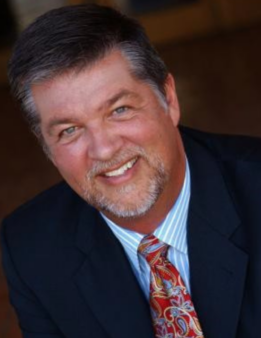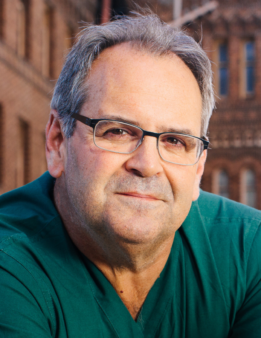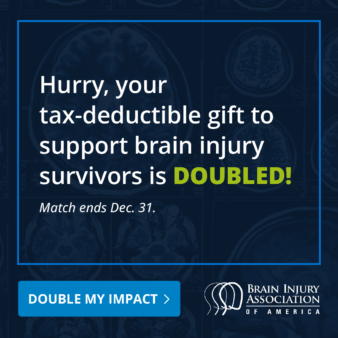BIAA Announces 2023 Berrol and Caveness Award Recipients
October 31, 2023

Fairfax, VA – The Brain Injury Association of America (BIAA) has announced the recipients of the annual BIAA Awards Program, which recognizes outstanding contributions to clinical service and research in brain injury. Mark Ashley, Sc.D., CCC-SLP, CCM, CBIST, is the recipient of the 2023 Sheldon Berrol, M.D., Clinical Service Award, and Geoffrey T. Manley, M.D., Ph.D, is the recipient of the 2023 William Fields Caveness Award. The awards were presented during the American Congress of Rehabilitation Medicine annual conference on October 31, 2023.
“BIAA proudly recognizes the contributions and accomplishments of Dr. Ashley and Dr. Manley,” said Rick Willis, BIAA president and CEO. “Every year, we are honored to celebrate two individuals who have made outstanding contributions to the fields of brain injury clinical service and research. Dr. Ashley and Dr. Manley have throughout their careers continually improved the quality of care and bettered the lives of people with a brain injury.”
Mark Ashley, Sc.D., CCC-SLP, CCM, CBIST – 2023 Sheldon Berrol, M.D. Clinical Service Award

Dr. Ashley is the founder and chief executive officer of the Centre for Neuro Skills (CNS), a post-acute rehabilitation provider that has offered brain injury and stroke treatment programs since 1980. He has been awarded the Sheldon Berrol, M.D., Clinical Service Award, which recognizes a clinician who, through a long service career, has made outstanding contributions to improving the quality of care, professional training, and education in the field of brain injury.
“I am moved and deeply honored to receive the Sheldon Berrol M.D. Clinical Service Award,” Dr. Ashley said. “As a colleague and friend, Dr. Berrol’s passion was inspirational for everyone around him and, as a physician, it was life changing for patients and their families. His vision and conviction to help persons with brain injury set the stage for where we are today. My only hope is to similarly serve patients and their families through our work at Centre for Neuro Skills.”
Since its inception, CNS has expanded its service areas, with facilities throughout California and Texas. CNS teaches life skills to individuals with brain injuries, with a mission of reducing disability, maximizing independence, and achieving the maximum possible quality of life for patients and their families. As each brain injury is unique, CNS tailors each patient’s treatment plan to their individual needs. With a focus on patient outcomes, CNS ensures progress by offering intensive therapies that aim to transform lives while pursuing and advancing the best possible clinical treatment, education, and research.
In 2011, Dr. Ashley established the Clinical Research and Education Foundation, a nonprofit research organization that advances public and clinical understanding of brain injury causes and treatment. He has been published in multiple professional and research publications and peer-reviewed journals, and is the author of four books: Working with Behavior Disorders: Strategies for Traumatic Brain Injury Rehabilitation; Traumatic Brain Injury Rehabilitation; Traumatic Brain Injury Rehabilitation, 3rd Edition; and Traumatic Brain Injury Rehabilitation, 4th Edition. He is a Past Chair of the Corporate Advisory Committee of the American Academy for Certification of Brain Injury Specialist and a former California Traumatic Brain Injury Council Member. Dr. Ashley is also an adjunct professor at the Rehabilitation Institute of the College of Education at Southern Illinois University.
Geoffrey Manley, M.D., Ph.D – 2023 William Fields Caveness Award

Dr. Manley is the Chief of Neurosurgery at Zuckerberg San Francisco General Hospital and Professor and Vice Chairman of Neurological Surgery at the University of California-San Francisco (UCSF). He is a trauma neurosurgeon and co-director of the Brain and Spinal Injury Center and an internationally recognized expert in neurotrauma, having published more than 200 manuscripts that reflect a wide range of research interests, from molecular aspects of brain injury to the clinical care of head trauma patients.
Dr. Manley is the Contact Principal Investigator for both the Transforming Research and Clinical Knowledge in Traumatic Brain Injury (TRACK-TBI) U01 research project funded by the National Institute of Neurological Disorders and Stroke and the Department of Defense TBI Endpoints Development (TED) Initiative. The TRACK-TBI Pilot dataset, collected from participants at 18 U.S. sites and across the injury spectrum, is the first to populate the Federal Interagency Traumatic Brain Injury Research repository. This precision medicine dataset resides in a publicly accessible infrastructure of integrated databases, imaging repositories, and biosample repositories – a global platform to connect TBI’s best scientists.
The TRACK-TBI fully integrated TBI Information Commons will improve TBI classification/taxonomy for targeted clinical treatment trials; improve TBI outcome assessments by reducing the size and cost of clinical trials; identify the health and economic impact of mild TBI patient disposition; and create a legacy database with analytic tools and resources to support TBI research.
“I am deeply honored and humbled to receive the Caveness Award from the Brain Injury Association of America,” Dr. Manley said. “This award is a testament to the dedication and collaboration of my colleagues, mentors, students, and patients who have supported me throughout my career. I hope our continued efforts will ultimately improve the outcomes and quality of life for TBI patients and their families.”
More information about BIAA’s awards program can be found at biausa.org/awards.
###
About the Brain Injury Association of America:
The Brain Injury Association of America is the country’s oldest and largest nationwide brain injury advocacy organization. Our mission is to advance awareness, research, treatment, and education and to improve the quality of life for all people affected by brain injury. We are dedicated to increasing access to quality health care and raising awareness and understanding of brain injury.

